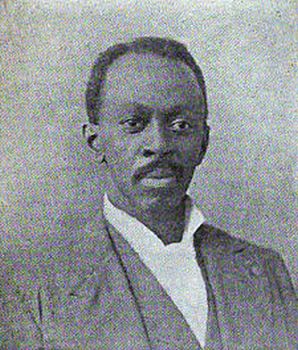The folklore origins of Juneteenth
Though Juneteenth was only designated a federal holiday in 2021, its history as an annual celebration spans back to the end of the Civil War. Throughout America, as the good news of emancipation spread across the land, celebrations commemorated the freeing of hundreds of thousands of enslaved Americans. Because this news traveled at 1860s speed, these celebrations occurred at variable dates with variable traditions.The stories surrounding the origins of these celebrations are variable folk histories, containing striking imagery from tearful slave owners to heroic, mule-riding veterans.
Bringing the News from Washington DC to Oklahoma
"One [story] is of paramount importance to us. How Juneteenth got started. The story is legendary in nature. However, my eighty-six year old father swears that it is the truth; that an ex-Union soldier (Negro) rode a mule from Washington, with a message given him by Abe Lincoln, Yessuh, all the way to this section of the country. And when he got to Oklahoma, he informed the slaves that they were free. From there he went to Arknsas [sic] and Texas. It was the nineteenth of June when he arrived in Oklahoma. My father swears it, and he says if his father was still alive, he would do the same swearing without batting his eyes. Many of the old-timers are with him one hundred percent."
--Wiggins, William H. "Free at Last" : A Study of Afro-American Emancipation Day Celebrations. PhD dissertation, Indiana University, 1974, p 83. Excerpt from a letter sent to the author by Haywood Hygh, Jr.
In other legend cycles, the June 19th date is explained because the slave owner withheld the news until another crop was in.
Houston, Texas: Emancipation Park
 "Since 1872, Emancipation Park has been the site of community and family celebrations for African-Americans in Houston. Although President Abraham Lincoln issued the Emancipation Proclamation in January 1863, slavery in Texas did not end until June 19, 1865, when the Union Army landed at Galveston to enforce it. The anniversary of emancipation in Texas, known as “Juneteenth,” is now an official state holiday in more than 25 states in America and is celebrated around the world. As the site for the original Juneteenth celebration in 1866 and one of the first parks in America purchased by African-Americans specifically for this event, in 1872, Emancipation Park remains an important symbol of a turning point in Texas and United States history." -Historic Buildings Survey, Library of Congress.
"Since 1872, Emancipation Park has been the site of community and family celebrations for African-Americans in Houston. Although President Abraham Lincoln issued the Emancipation Proclamation in January 1863, slavery in Texas did not end until June 19, 1865, when the Union Army landed at Galveston to enforce it. The anniversary of emancipation in Texas, known as “Juneteenth,” is now an official state holiday in more than 25 states in America and is celebrated around the world. As the site for the original Juneteenth celebration in 1866 and one of the first parks in America purchased by African-Americans specifically for this event, in 1872, Emancipation Park remains an important symbol of a turning point in Texas and United States history." -Historic Buildings Survey, Library of Congress.
Photo Credit: Houston Public Media.
The Spread of Juneteenth
In a 2009 interview with Smithsonian Magazine, Dr. William H. Wiggins answered the question: "How did Juneteenth celebrations spread out of Texas?" saying,
"The movement of this celebration was part of a larger group of emancipation days across the south. The first movement, right around WWII, was westward. So where you had black families moving to California from east Texas, and southwest Arkansas and Oklahoma, to work in the shipyards, or to work in the airplane factories, then Juneteenth started cropping up in those states."
Emancipation Celebrations in Chicago
 In the middle of the 19th century, with slavery still the rule of law in southern states, Chicago had an established, free population of African Americans who gathered together in jubilation to celebrate the news of emancipation as it reached the city on January 1, 1863. The day was thus established as a day of celebration, honored by Black Chicagoans for the next four decades, and community-wide celebrations emancipation celebrations were celebrated annually on both January 1, and September 22, the day Abraham Lincoln announced his intention to issue an emancipation proclamation. "The festivities held on these dates came to be known as Emancipation Day celebrations or jubilees" --Amber Bailey, “Days of Jubilee: Emancipation Day Celebrations in Chicago, 1853 to 1877,” Journal of the Illinois State Historical Society, vol. 109, no. 4, Dec. 2016, p. 353.
In the middle of the 19th century, with slavery still the rule of law in southern states, Chicago had an established, free population of African Americans who gathered together in jubilation to celebrate the news of emancipation as it reached the city on January 1, 1863. The day was thus established as a day of celebration, honored by Black Chicagoans for the next four decades, and community-wide celebrations emancipation celebrations were celebrated annually on both January 1, and September 22, the day Abraham Lincoln announced his intention to issue an emancipation proclamation. "The festivities held on these dates came to be known as Emancipation Day celebrations or jubilees" --Amber Bailey, “Days of Jubilee: Emancipation Day Celebrations in Chicago, 1853 to 1877,” Journal of the Illinois State Historical Society, vol. 109, no. 4, Dec. 2016, p. 353.
Photo Credit: Chicago Justice
National Freedom Day, 1947

In 1948, before Juneteenth or Martin Luther King Day were established as U.S. Federal holidays, Congress passed legislation creating National Freedom Day which honored the signing of the 13th Amendment. The effort to create it was led by Richard.R. Wright (1855-1947), who was born into slavery and became a successful banker, educator, soldier, and civil rights advocate. National Freedom Day was the first federal holiday honoring African American heritage. but it came, perhaps, too early and without enough fanfare to gain the same widespread recognition as Juneteenth.